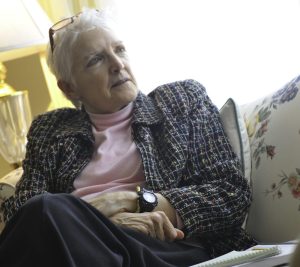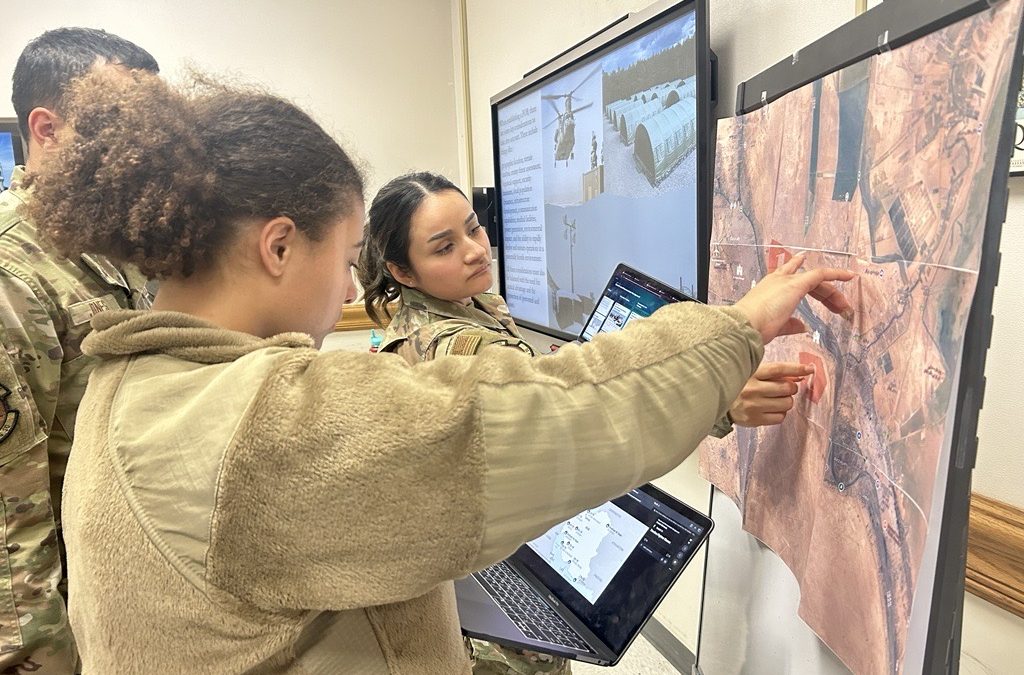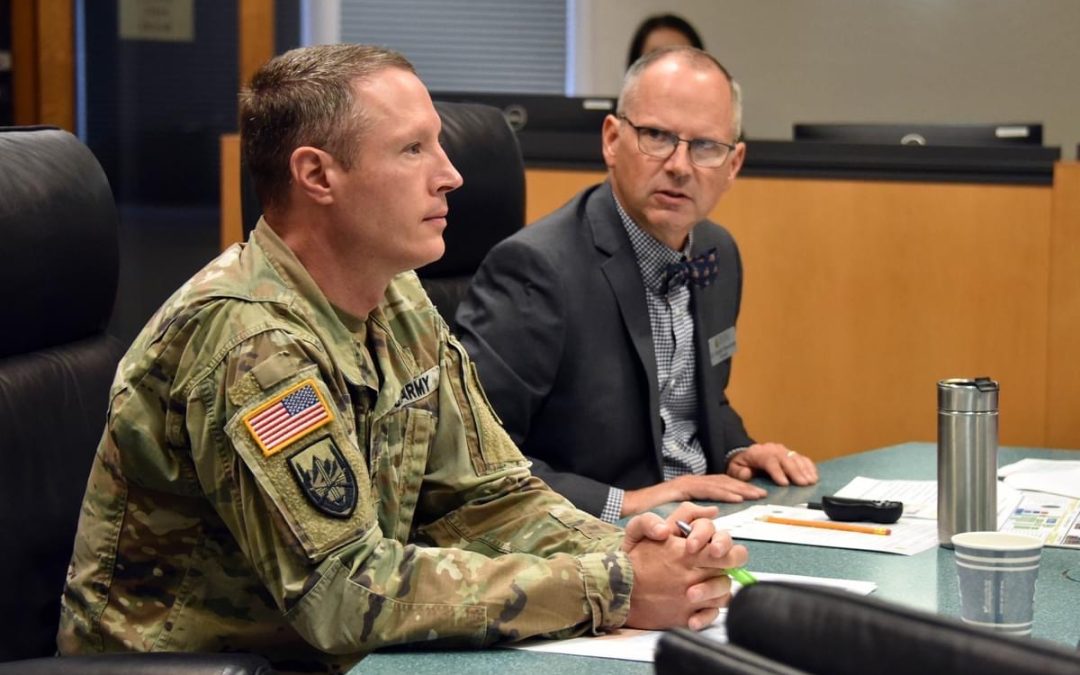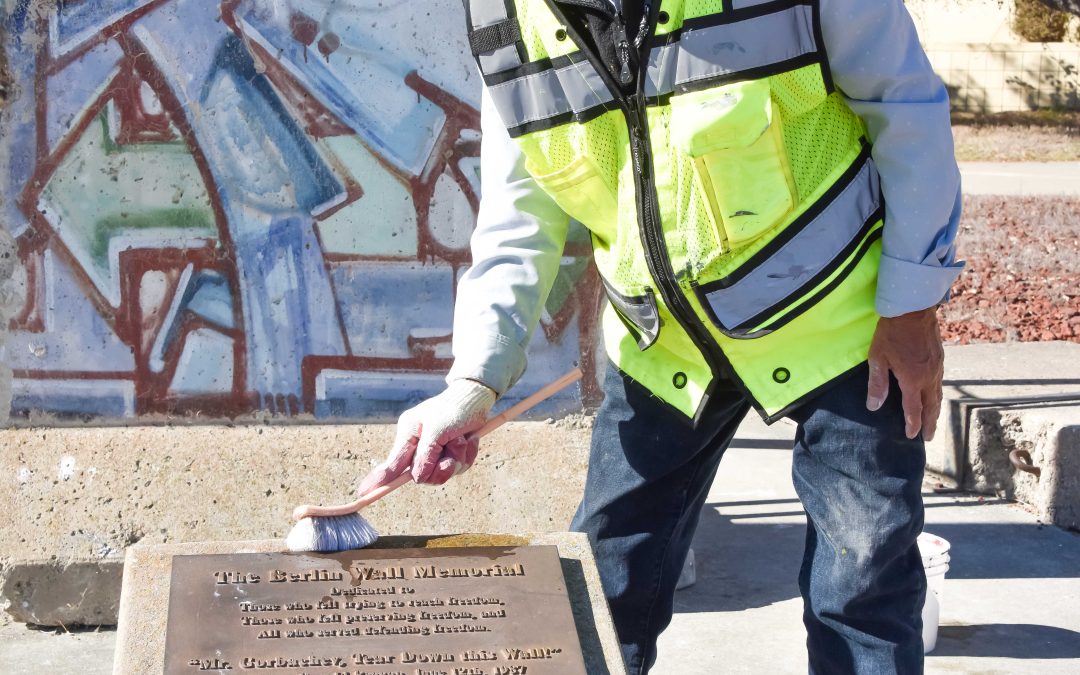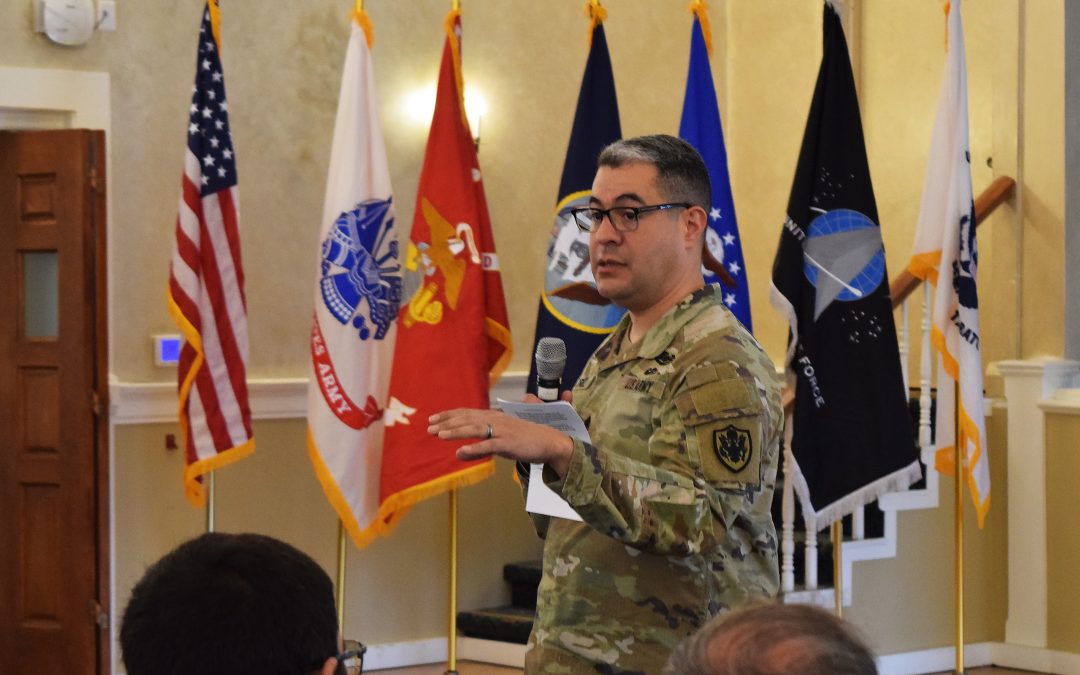For Woman’s History Month, we celebrate one of our own. A milestone event, the first appointed female to lead the Defense Language Institute Foreign Language Center was Col. Sue Ann Sandusky from 2007-2010.
The day Sandusky received an email entitled “Hot Job,” she did not want to open it for fear that it would send her away from the U.S. Army War College where she had just wrapped up her first year as director of African Studies.
“I didn’t open it for a minute, and thought maybe it was Africa Command, which was just standing up about that time. When I finally opened the email it said, ‘We are considering you to be the commandant of DLI,’ I about had a heart attack. I was just flabbergasted and so excited I could hardly contain myself, and then I thought, oh this has to be a mistake this can’t really be true,” said Sandusky, in an interview in her home in Ohio in March 2016.
“I always say that becoming the commandant of DLI was a dream-come-true, except that I never dared dream that,” she explained, surrounded by her four African village dogs that she adopted during assignments in Africa.
Though Sandusky attributes her selection to the war-time situation, the fact was that Sandusky had a unique background and was highly qualified for the job with her four higher education degrees, a Bachelor of Arts in Journalism and Government, a Master of Arts in Soviet and East European area studies, another master’s in philosophy and political science, and a third master’s in Strategic Studies. She had been a Foreign Area Officer for Sub-Saharan Africa and served as defense attaché in Liberia, the Democratic Republic of Congo, the Ivory Coast, and Nigeria. Her relations with the people of Liberia were so good that she was sent back intermittently and has been credited with helping achieve peace for the country through skillful negotiation.
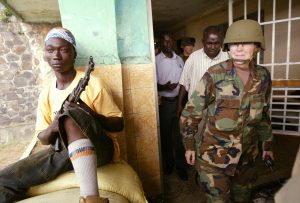
The U.S. Defense attache to Liberia, Col. Sandusky (R), passes a Liberians United for Reconciliation and Democracy rebel, August 8, 2003 in Monrovia, Liberia. American officials with Nigerian peacekeeper escorts ventured into LURD rebel territory, attempting to broker peace between the rebels and the besieged Liberian government. (Photo by Chris Hondros/Getty Images)
Against this background, Sandusky was more than eager to take on the challenge of running the Defense Language Institute Foreign Language Center because of her experience as a French student. “I loved my faculty. When I was a French Basic Course student in 1991/92, I thought it was the most enlightened place in the whole world. I had never experienced language learning like we did it at DLI, immersion in the classroom, all activities in French, the target language, and I just loved it. I knew it wouldn’t have happened if we hadn’t had these very skilled teachers.”
When Sandusky came on board in October 2007, the first challenge she faced was the re-release of the Defense Language Proficiency Test 5 in Modern Standard Arabic that had been pulled back from the field by her predecessor because of low scores received by linguists in the field and questions of validity of the test.
“It (test) had been fielded and the results were remarkably lower than anybody had anticipated. There was a lot of hues and cry from the field that something was wrong with the test… We went through a very thorough review, brought in outside experts to look at it,” described Sandusky.
In the end, a few adjustments were made to the test, but the basic conclusion was that the exam contained more challenging, authentic material and that linguists in the field needed to “crank up their game,” while instructors at DLIFLC needed to be trained to teach to the higher levels of proficiency required not only because of a more challenging exam, but because user agencies needed more competent linguists. By the end of Fiscal Year 2009, the new Arabic test had been on the street for a year, students were finally passing and more DLPT5 exams were coming out in other languages.
“There was a shock value,” said Sandusky, but linguists in the field and students eventually started passing. “They were true professionals–along with the faculty. Everybody reached new levels.”
About 18 months before Sandusky’s arrival, DLIFLC had been working on the Proficiency Enhancement Program, or PEP, which was a complex pathway to graduating students at the Interagency Language Roundtable Level: Listening 2+, Reading 2+ and Speaking 2. The Institute had received a $362 million in funding for the implementation of the five-year PEP plan that called for the increase of teacher/student ratio, smaller class sizes, more faculty development for instructors, better curriculum, the use of savvy new technology in the classrooms, and separately, the construction of three new instructional buildings.
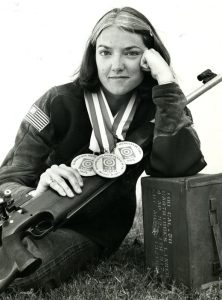
Sandusky won three gold medals in the 1978 World Shooting Championships and was a three-time collegiate All-American in rifle shooting at Texas Christian University. Her other shooting awards include the Distinguished International Shooter Badge, Distinguished Rifleman Badge and President’s Hundred tab.
(Photo John Jay College of Criminal Justice)
Sandusky felt that the instructors, those charged with leading the PEP transformation in the classroom, were under a lot of stress. They were worried about their students passing the new DLPT5 that was about to be released, worried about the new technology coming into the classrooms that many had never used before, and worried that the curriculum would change too fast and become too challenging.
“Things were difficult with the new DLPT5 arriving at the same time we were trying to raise our outcomes to 2+/2+/2. I decided that we needed a morale boost. I wanted to make sure the faculty understood how important they were to helping our students reach the new levels,” Sandusky explained. She noted that 2009 was designated the “Year of the Faculty.”
“Another very important component was a review the salary structure,” Sandusky said. The Faculty Pay System had not been adjusted since 1997, resulting in instructor salaries that lagged significantly behind others working in comparable positions in government service and academia.
“Col. Sandusky sent the first letter to the Defense Civilian Personnel Advisory Service in Washington D.C., telling them that we would like to modify the FPS pay schedule structure. Then sequestration happened and DCSPAS was prevented by law from making any changes,” explained Rick Donovan, FPS manager.
An important initiative directed by Sandusky was investment into the furthering of instructor higher education degrees in foreign language acquisition. To this end, Sandusky approved funding for tuition assistance for individual courses which could lead toward a degree in support of DLIFLC teaching goals. Consequently, California State University Monterey Bay established an Instructional Science and Technology Degree a master program which DLIFLC instructors could sign up for and attend via a hybrid of online and campus courses. By the end of 2009, more than 80 instructors had completed their master degrees.
“The emphasis on faculty development was very important because PEP was fundamentally about what was going on in the classroom. Instructors had to rethink what they were doing so that the students could advance at the fastest possible pace,” said Sandusky.
Internally, the Faculty Development division grew by leaps and bounds, introducing new courses for instructors such as learning management applications for teaching, how to design creative tasks for working with interactive whiteboards in the classroom, and leadership development.
“Also, as part of the ‘Year of the Faculty,’ I wanted an effort to identify pathways to leadership for the development of future academic leaders for DLI. How could you move up from a faculty member to dean, how could you go from teaching in the classroom to working on the DLPT, how could you use your other skills and talents to contribute to the overall excellence of DLI?” asked Sandusky rhetorically.
To improve communication with faculty, Sandusky held a series of town halls where she attempted to explain to instructors where they stood in relation to the echelons of the U.S. Government above them. She broke it down to four levels, demonstrating that the instructors at DLIFLC were not that far removed from the White House, or the Pentagon, in terms of their “chain of command” and that they were making direct contributions to national security every time a student graduated from DLI as a proficient linguist.
Sandusky often repeated her favorite African proverb in her town halls, “Wisdom is like the baobab tree, no single person can embrace it,” trying to signal to faculty and staff that achieving a mutual goal requires collaboration.
“That was my way of saying to the faculty, and the staff, that everyone is important and that we are all here working together to make DLI the excellent institution that it needs to be for the national security of our country in a time of war. I just reminded the instructors that some of these students were going to be in the front lines in a few months and they had to be as well-equipped as we can possibly make them – that was my motivation.”
Under her watch, the initiative for establishing an academic network was formulated and moved forward by Assistant Commandant Air Force Col. Dan Scott, and Air Force Lt. Col. George Serafin. With government-controlled network restrictions on accessing certain foreign sites ramped up, DLIFLC faculty were hampered in their teaching efforts. When the government banned the use of external devices on government computers, many classroom teaching activities came to a screeching halt with no way to exchange data between instructors and teachers.
“Eventually I found out that NPS (Naval Postgraduate School) had an education network which we called “dot-EDU network, and learned what that meant – possibly fewer restrictions. I thought if we could go the dot-EDU route, maybe we would be a little bit more in control of our own destiny. I wasn’t sure about the cost, so I didn’t try to sell the idea as a cost savings,” said Sandusky, about getting buy-in from Army leadership regarding the idea. The dot-EDU network would become a reality at DLIFLC with the next commandant in 2010.
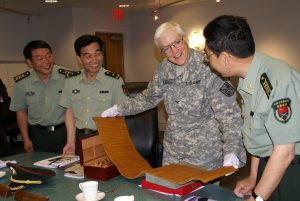
Sandusky examines an antique scroll while host the delegation from the People’s Republic of China (Photo Natela Cutter)
Externally, Sandusky has been credited for having changed the rhetoric about DLIFLC in Washington, D.C., and beyond. DLIFLC’s flexibility and willingness to jump to support any and all foreign language needs to deploying forces was unprecedented. Since the early 1990s, such support had traditionally involved sending predeployment materials to service members around the world, but with the war on terrorism, DLIFLC began establishing Language Training Detachments, not only for professional linguists, but also for the General Purpose Force, in order to give direct language instruction to those who were going to put boots on the ground.
By the fall of 2009, the Chairman of the Joint Chiefs of Staff, Adm. Mike Mullen, gave a directive for DLIFLC to support the training of Afghanistan/Pakistan Hands, a new program that would teach seasoned military service members the languages spoken in the countries they would be deploying to, via a five-year language program broken down into specific phases. Additionally, three new locations would be opened up at Forts Carson, Campbell and Drum, to teach 16-week basic language and culture skills to young deploying service members at the tactical level.
Through all of these endeavors, Sandusky never doubted the capability of her “extraordinary faculty and staff.” Before departing DLIFLC, she threw a very sizeable picnic on Soldier Field for faculty and staff. They arrived in droves to bid her farewell.
Cutter, Natela. “Sue Ann Sandusky the Faculty’s Commandant.” GLOBE Magazine, Spring 2016, p. 86-89.

